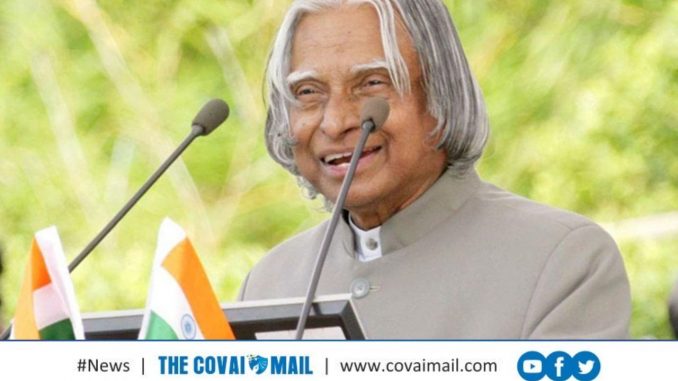
Dr.Abdul Kalam’s legacy does not limit to his immense contributions to the nation’s Scientific and Technological development but it extends beyond that. His words are true wisdom and I had the privilege to read about a few of that a couple of years ago when I was in college.

A chapter from his famous book – ‘Ignited Minds – Unleashing the Power within India’ titled ‘Patriotism Beyond Politics and Religion’ was a prescribed syllabus for us.
Dr.Kalam shares various nation-building ideals in that chapter and I found that I must share that with the readers, as a way of sharing the wisdom and legacy that he has given to us all.
Patriotism Beyond Politics and Religion – Dr.APJ Kalam
I call to my people to rise to greatness. It is a call to all Indians to rise to their highest capabilities. What are the forces which lead to the rise or fall of nations? And what are the factors which go to make a nation strong? Three factors are invariably found in a strong nation; a collective pride in its achievements, unity and the ability for combined action.
For a people and a nation to rise to the highest, they must have a common memory of great heroes and exploits, of great adventures and triumphs in the past. If the British rose to great heights it is because they had great heroes to admire, men like Lord Nelson, say, or the Duke of Wellington. Japan represents a fine example of national pride. The Japanese are proud of being one people, having one culture, and because of that they could transform a humiliating military defeat into a triumphant economic victory.
All nations which have risen to greatness have been characterized by a sense of mission. The Japanese have it in large measure. So do the Germans. In the course of three decades, Germans. In the course of three decades, Germany was twice all but destroyed. And yet its people’s sense of destiny never dimmed. From the ashes of the Second World War, it has emerged a nation economically powerful and politically assertive. If Germany can be a great nation, why can’t India?
Unfortunately for India, historic forces have not given a common memory to all communities by taking them back to their roots a millennium down the ages. Not enough effort has been made in the last fifty years to foster that memory.
I had the fortune of learning many of our religions in the country from my childhood, in high school and then onwards for nearly seventy years. One aspect I realize is that the central theme of any religion is spiritual well-being. Indeed it should be understood that the foundation of secularism in India has to be derived from spirituality.
It is because our sense of mission has weakened that we have ceased to be true to our culture and ourselves. If we come to look upon ourselves as a divided people with no pride in our past and no faith in the future, what else can we look forward to except frustration, disappointment and despair?
In India, the core culture goes beyond time. It precedes the arrival of Islam; it precedes the arrival of Christianity. The early Christians, like the Syrian Christians of Kerala, have retained their Indianness with admirable determination. Are they less Christian because their married women wear the mangalsutra or their menfolk wear the dhoti in the Kerala style? Kerala’ Chief Minister, A. K. Antony, is not a heretic because he and his people are part of Kerala’s culture. Being a Christian does not make him an alien. On the contrary, it gives an added dimension to his Indianness. A. R. Rahman may be a Muslim but his voice echoes in the soul of all Indians, of whatever faith, when he sings Vande Matram.
The greatest danger to our sense of unity and our sense of purpose comes from those ideologists who seek to divide the people. The Indian Constitution bestows on all the citizens total equality under its protective umbrella. What is now cause for concern is the trend towards putting religious form over religious sentiments. Why can’t we develop a cultural—not religious—context for our heritage that serves to make Indians of us all? The time has come for us to stop differentiating. What we need today is a vision for the nation which can bring unity.
It is when we accept India in all its splendid glory that, with a shared past as a base, we can look forward to a shared future of peace and prosperity, of creation and abundance. Our past is there with use forever. It has to be nurtured in good faith, not destroyed in exercises of political one-upmanship.
The developed India will not be a nation of cities. It will be a network of prosperous villages empowered by telemedicine, tele-education and e-commerce. the new India will emerge out of the combination of biotechnology, biosciences and agriculture sciences and industrial development. The political leaders would be working with the zeal born of the knowledge that the nation is bigger than individual interests and political parties. This attitude will lead to minimizing the rural-urban divide as progress takes place in the countryside and urbanites move to rural areas to absorb the best of what nature can give in the form of products and wealth.
The most important and urgent task before our leadership is to get all the forces for constructive change together and deploy them in a mission mode. India is a country of one billion people with numerous religions and communities. It offers a wide spectrum of ideologies, besides its geographic diversity. This is our greatest strength. However, fragmented thinking, compartmentalized planning and isolated efforts are not yielding results. The people have to come together to create a harmonious India.
The second vision of the nation will bring about a renaissance to the nation. The task of casting a strong India is in the hands of a visionary political leadership.
(The contents are from – ‘Ignited Minds – Unleashing the Power within India’ by Dr.Kalam, published by Penguin Books. All rights belong to the publisher.)
